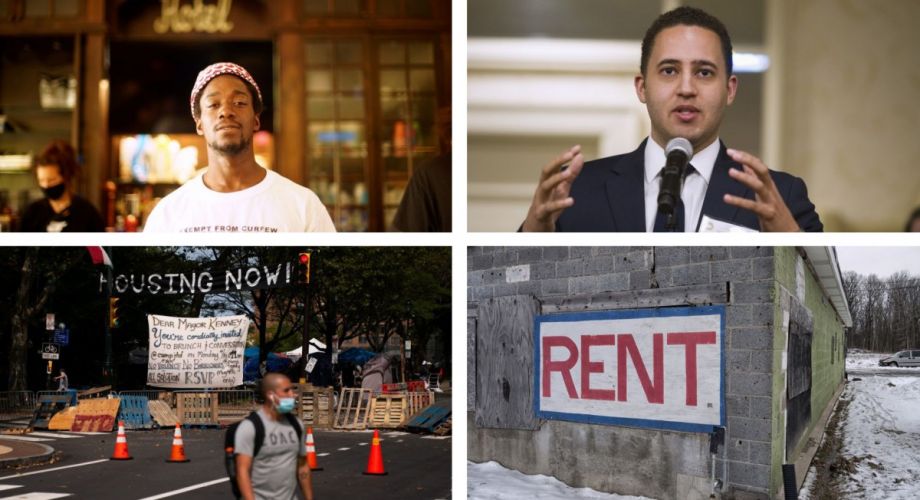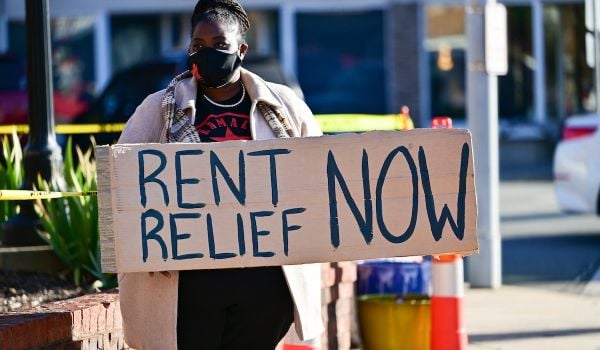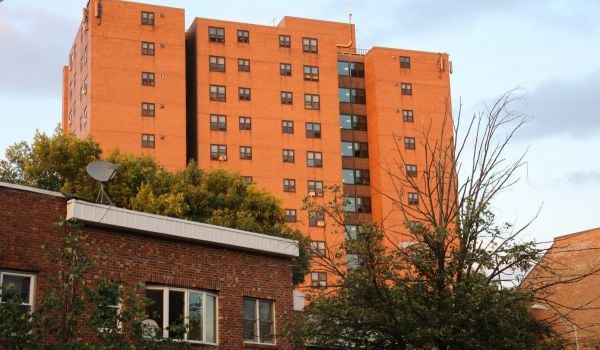The horrors of 2020 are too grim to repeat, and its end can’t come soon enough. But as cities look ahead to Covid-19 vaccinations and the (fingers-crossed) eventual reopening of society, they have a lot to consider about how the events of this year have illuminated deep problems in housing systems, and in some cases, shown a path forward to a better future. Here’s a look back at how Next City covered the housing beat in 2020.
Hotels Became Shelters and Permanent Housing
The most basic and impactful public-health response to the spread of Covid-19 was an order to stay at home. But that did nothing for people experiencing homelessness. And with a deadly virus being transmitted by people in close proximity, traditional homeless shelters with large groups of people in close quarters, did not present a good solution. Cities around the country began buying up hotel rooms to help vulnerable people quarantine. And some of those programs took a longer-term view.
In April, the city of Missoula, Montana, purchased a small motel near its downtown, with the goal of using its rooms as temporary emergency shelter for people experiencing homelessness and, eventually, turning it into permanent affordable housing. Later, California embarked on a $600 million program called Project Homekey, to buy up old hotels and motels around the state and create permanent housing for people experiencing homelessness.
“The wonderful thing about hotel rooms and non-congregate settings is that you have the flexibility to serve individuals, couples, and different family configurations,” Lavonna Martin, director of health, housing, and homeless services for Contra Costa County, told Next City.
Recently, cities have been considering shutting down some hotel shelters as they spend down federal money from the CARES Act. But last week, according to the National Low Income Housing Coalition, FEMA agreed that it would reimburse cities for non-congregate sheltering costs for the “duration of the emergency.”
Ithaca Tried to ‘Cancel Rent’
In the spring, as the scale of the pandemic’s economic wreckage was starting to become clear, tenants and housing advocates began calling for rent and mortgage payments to be suspended during the emergency, to prevent people from being evicted en masse or building up huge past-due rent debts that they couldn’t pay off. Rent never ended up being “canceled” on a grand scale, but some jurisdictions tried. In June, as Next City reported, the common council in Ithaca, New York, “approved a resolution requesting ‘that the New York State Department of Health authorize the Mayor to forgive via executive order three months of all residential and small-business rent payments and additional fees which are due through June 2020.’” The idea was that the mayor would use executive power during the health emergency to wipe out three months of past-due rent.
Local officials acknowledged at the time that it was a “longshot.” And in October, The Cornell Daily Sun reported that the authorization had never come, “and it is unclear how seriously it was ever considered.” Still, according to the Sun report, the Ithaca Tenants Union, which had organized support for the #CancelRent resolution, was trying to get a response from the state, and providing support for at-risk tenants through an eviction tip line.
Cities Started Their Own Rental-Assistance Programs
Even with eviction moratoriums in place, many cities worried what would happen to tenants who accrued large arrearages, and to small landlords who rely on rent to pay their mortgages. As Next City reported in May, many cities launched small rental-assistance programs, aiming to distribute small amounts of money to help struggling tenants cover housing costs for a month or two. Almost all of the programs were immediately oversubscribed. The National Low Income Housing Coalition estimated the total need for rental assistance nationwide at around $100 billion, and in May, the House of Representatives approved that amount as part of the HEROES Act. But that bill didn’t make it through the Senate.
As the New York Times recently reported, many jurisdictions have also had trouble figuring out the logistics of distributing money to tenants in need. Philadelphia, which was somewhat ahead of the curve with plans to launch rental assistance prior to the pandemic, was scrambling to spend its rental-assistance funding by an end-of-year deadline. Paired with an eviction diversion program that requires landlords to request mediation with tenants prior to going to court, the city said that rental assistance was successfully helping stave off evictions.
The Federal Government Stepped Up (Sort Of)
“Many people are suffering and it is quite bad out there for many people in our society,” Mike Konczal, the director of progressive thought at the left-leaning Roosevelt Institute, told Next City in July. “But the trillion-dollar stimulus has helped put a floor on how bad it has gotten.”
As cities have worked to respond to the public-health and economic threats posed by the pandemic, they have had extra help, specifically money, from the federal government. Through direct cash payments, beefed-up unemployment insurance, the Paycheck Protection Program, forbearance for mortgage holders and a moratorium on evictions, the CARES Act helped prevent untold harms. The Centers for Disease Control also extended an eviction moratorium through the end of 2020. And cities have used federal money to provide a range of housing assistance programs, like the previously mentioned hotel shelters and rental-assistance program. But since the spring, when the CARES Act provided $150 billion for state, local, and tribal governments, federal aid to smaller jurisdictions has become a source of controversy. Congress left state aid out of its end-of-year stimulus package after conservative Republicans took to calling it a “blue state bailout,” as the New York Times reported. State and local governments now face devastating budget gaps, and how Congress and the incoming Biden administration approach the issue will have huge consequences for cities’ ability to deal with housing and homelessness.
Activists Took Matters Into Their Own Hands
2020 was a year of death, suffering, and grief. But it was also a year of protest, and solidarity between activists and people experiencing homelessness. In Minneapolis, during the uprising after the police killing of George Floyd, a group of protesters temporarily took over a Sheraton Hotel and filled each of its rooms with unhoused people.
“There was always this hovering feeling,” one of the organizers told Next City, “that it was beautiful, and that it could be a disaster at the same time. The real feeling of risk, of unsafety, was happening in the street because of the military response and civil unrest. That was the initial priority — to get people inside.”
The Minneapolis “sanctuary hotel,” or Share-a-Ton, was a short-lived experiment in community-led housing action. And in Philadelphia, a longer-term occupation of two public properties elevated the issue of homelessness in the city, and pushed the city and the Philadelphia Housing Authority to donate vacant properties into a new land trust operated by the people who organized the protest camps. And now, the city is planning two tiny-home villages for people experiencing homelessness, pushed forward by some of the same advocates.
“We didn’t set out to end homelessness in Philadelphia,” one of the organizers told Next City this fall. “We didn’t set out and say we were going to feed every unstable and housing-insecure person in Philadelphia. But we honored the commitments to the people that we made relationships with this summer, to make sure that people got into housing before it got cold.”
This article is part of Backyard, a newsletter exploring scalable solutions to make housing fairer, more affordable and more environmentally sustainable. Subscribe to our weekly Backyard newsletter.

Jared Brey is Next City's housing correspondent, based in Philadelphia. He is a former staff writer at Philadelphia magazine and PlanPhilly, and his work has appeared in Columbia Journalism Review, Landscape Architecture Magazine, U.S. News & World Report, Philadelphia Weekly, and other publications.
Follow Jared .(JavaScript must be enabled to view this email address)

















